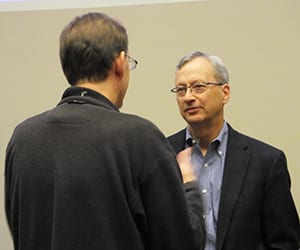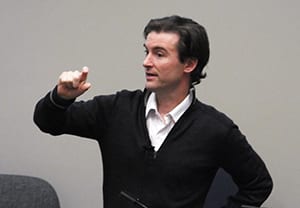Ithaca, New York, USA
September 30, 2015

Don Tennant, Cornell Nanoscale Facility Director of Operations, speaks to BTI’s Professor Eric Richards
Don Tennant, Director of Operations of the Cornell NanoScale Science & Technology Facility (CNF) and Professor Abe Stroock of the chemical and biomolecular engineering department gave a presentation Monday to the Boyce Thompson Institute research community on available nanotechnology resources for plant and agricultural research.

Professor Abe Stroock, Department of Chemical and Biomolecular Engineering
The CNF is looking to expand their collaborations with plant scientists. They offer a wide variety of services, including 3D and inkjet printing, etching and high-resolution imaging, which have been used for biological applications such as biocompatible transistors and a miniature “body-on-a-chip.” The facility recently received an $8 million grant from the National Science Foundation to support its participation in the National Nanotechnology Coordinated Infrastructure. The CNF also works with the McGovern Center, Cornell’s incubator for life science companies, and Start-Up NY, a state program that supports tech startups near universities, to help launch new companies.
Stroock presented existing nanotechnology projects at Cornell, including Edwin Kan’s research on RFID chips and radio waves, which could be used to monitor plants in a field or greenhouse, and Stroock’s own work on a “synthetic tree” and implantable microtensiometers that can be used to study water uptake in plants. These sorts of precise, micro-scale measurements could be useful to explore cellular functions or could be paired with genetic work to track down genes that contribute to different traits, such as drought tolerance.
Anyone interested in touring the CNF facilities should contact Don Tennant and those interested in learning more about collaboration opportunities can contact Abe Stroock. To explore the feasibility of a project and see the five steps to getting started, visit the CNF website.